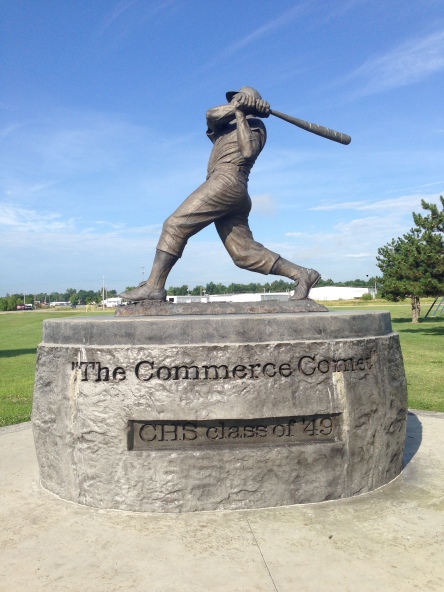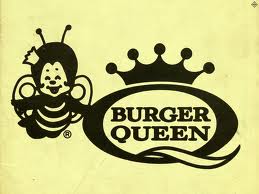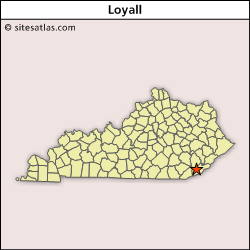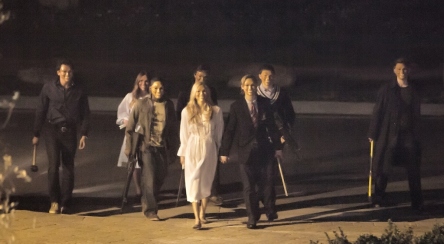I grew up in Loyall, Kentucky, a small town about which I’ve written before. Loyall, so the story goes, was named after an executive for the Louisville & Nashville Railroad which built its switching and maintenance yard in Loyall. I suppose that’s true, although I’ve never met anyone named Loyall nor did he leave any descendants in my hometown. Then again, it might just be a misspelling of the word “loyal.”
Loyall is in Harlan County, tucked in the southeast corner of Kentucky on the Virginia border. Bell County, to our south, is all that protects from Tennessee. As I grew older, I met many people from other small towns and visited quite a few such places, too. Loyall wasn’t much different than these other places. People knew their neighbors, went to school, gossiped about each other and did all the other things people do.
For most of my childhood, the posted population of Loyall was 1100. I have no idea if that was even close to accurate. Honestly, it didn’t seem like that many people lived there. We had one main street, one red light, a few small grocery stores, a school, a full-service gas station, barber shop, post office and an honest-to-goodness corner drugstore with a soda fountain. We even had a movie theater and drive-in restaurant. The L&N yard, though, is what dominated the town.
The Loyall Yard was built in the early 20th century to accommodate the burgeoning coal industry. It was a switching yard with multiple tracks, a turntable and mechanic’s shop. By the time I came around, the maintenance folks had all moved over to the L&N yard in Corbin, Kentucky. The Loyall Yard was still a big deal. Trains ran in and out of it day and night.
Until I was about 12 years old, I lived about 200 yards from the railroad track and a crossing. If you lived in Loyall, you got used to two sounds: 1) trains slowly moving in and out of the yard; and 2) the ringing of the crossing bell. To this day, I think I could fall asleep with a bell ringing beside my head.
In my memory, everyone in Loyall worked at the yard, although that’s not really the case. My parents didn’t work for the L&N, but my Dad’s brother Jack did. Uncle Jack told me that I could identify the old men who used work as couplers in the Yard by their missing fingers. My Dad told me to ignore that “foolishness.” Frankly, I don’t remember a bunch of finger-less old men in Loyall. I was terrified of people who had missing limbs, fingers, etc. I would remember these dudes if they had been hanging around.
We were accustomed to trains but only coal trains. When my family went on vacation, I was intrigued by trains pulling tank cars, flat cars and even the occasional passenger train. Our trains consisted of a couple engines, coal hopper cars and a caboose.
This is all a long way of saying that we knew about trains. We knew people that worked on them, engineered them and road the cabooses. Of course, we also knew the people that mined and loaded the coal that went on those trains. It would have taken a lot for a train to get our attention. The United States Army took care of that in 1970.
I was eight years old when the Nerve Gas Train came to town. That’s not a typo—it was a train loaded with freakin’ nerve gas! I remember my eighth birthday. I was at Yellowstone National Park with my family. My Aunt Norma surprised me with a cake. She also surprised me by buying every piece of junk I had begged for in every store and gift shop we visited. She gave me a bag of marbles, jacks and sundry other items. My parents gave me a baseball glove and Pete Rose bat—that was the summer I became a baseball fan. I still have that bat, but I digress.
I need to digress again. I was a worrier–yes, even at eight years old. What does an eight year old have to worry about? Lots of stuff. I hated school, so I worried about that. I was scared of storms, so I worried about those, too. I worried about being so small and skinny, even though most of my friends were, too. Oh, don’t forget people with missing fingers. I was scared of my great-grandmother because she had a glass eye. Really, it was a sort of generalized brooding which occasionally focused on specifics worries, both real and imagined. Needless to say, the thought of nerve gas train was worrisome.
How did we get a Nerve Gas Train? That’s a fine question. I’m not real sure, but I have done some cursory research, which I’m sure some Harlan County historian will quickly correct. It seems that the United States Army had a large cache of chemical weapons, including nerve gas. As we’ve learned over the years, disposing of such weaponry is not nearly as easy as making it. We know that well here in the Commonwealth of Kentucky where we maintain an enormous stockpile of such weapons in Madison County, some 120 or so miles away from Loyall.
The Bluegrass Army Depot stores such delights as sarin gas, VX and mustard gas. “VX” is shorthand for “venomous agent X,” a nerve agent. It sounds like Dr. Evil named it. I suppose it’s so deadly that no one could come up with a more appealing name. I guess the Nerve Gas Train had goodies like that on board.
In 1970, the Army came up with a plan to dispose of some of these weapons by dumping them in the Atlantic Ocean. I know–that sounds like a plan that Wile E. Coyote or a dull-witted high school sophomore would come up with, but it was a plan. Soooo….they loaded a bunch of them on a train.
That’s how Loyall got on the path of the Nerve Gas Train. Boy, were people excited. It was in the newspaper. We talked about it at school. People said that even a small leak would likely wipe us all out. If the train wrecked? Cataclysm. We occasionally had train derailed. We even had a disastrous head-on collision near Loyall once. There was even loose talk that the Soviets would love to sabotage the train. We were quite ready in Harlan County to take the Red Scourge. There was some real potential here. People were excited.
I’m serious. We were excited. Okay. They were excited. I was more terrified. I envisioned a train pulling flatcars loaded with Saturn rockets chock full of venomous nerve agents. For some reason, my mind’s eye saw them steaming with toxic vapors. I hadn’t been this worked up since a rumor that a busload of hippies were coming to town. (By the way, they didn’t, much to my disappointment. I always liked hippies.)
We were like the citizens of Mayberry on The Andy Griffith Show awaiting the arrival of the gold truck! Unlike Mayberry, though, our shipment wasn’t supposed to be secret. I don’t remember anyone holding up signs, but they should have.
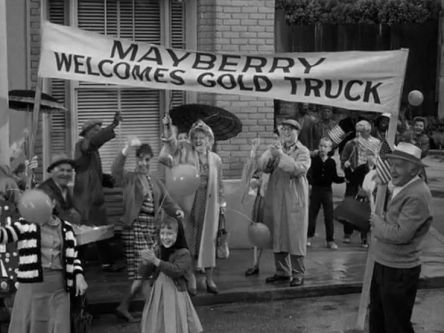
So, what happened? The train came through town. People gathered at the railroad tracks and watched. My father mocked them, of course, pointing out to me that it was just a train and no big deal. I saw it go by. No Saturn rockets. No steaming canisters of deadly gas. Not even the smallest leak. No one collapsed and died. No derailments or collisions. No Russian attacks. As far as I know, no one in the county was harmed in any way. It was just a train pulling some nondescript cars.
Here’s a link to podcast discussing the Nerve Gas Train. According to these guys, it carried sarin gas which is neutralized when it comes in contact with salt. That explains the dumping in the ocean. Apparently, there were troops on the train, ambulances and decontamination equipment. I don’t remember any of that. Sound pretty cool, though.
So what? We liked it. It was something to do. Not everyone sees a Nerve Gas Train, and I did. Or at least I think I did. Like I said, I was pretty terrified. Maybe I stayed in my room, and through the fog of time now believe I saw it. I like to think I did.
©www.thetrivialtroll.com 2018



